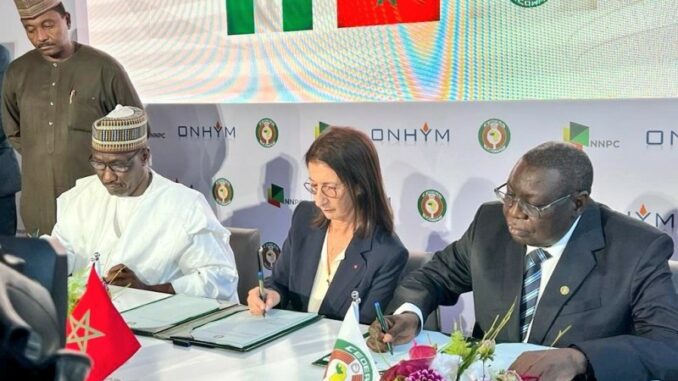
Morocco’s National Agency for Mines and Hydrocarbons (ONHYM), Nigeria’s National Petroleum Company Limited (NNPC), and the Economic Community of Western African States (ECOWAS) signed Thursday in Rabat a Memorandum of Understanding (MoU) for the Morocco-Nigeria gas pipeline project.
Speaking at the signing ceremony, ONHYM Director General Amina Benkhadra highlighted the Morocco-Nigeria gas pipeline’s potential to boost regional economic integration and reinforce sustainable development in the west African region.
Benkhadra highlighted the NNPC’s experience in operating major oil and gas projects, as well as the “technical expertise it is bringing to this challenging project.”
“Energy is essential to all economic development, and gas is the backbone of the energy transition,” Benkhadra said, emphasizing Africa’s “significant resource that could be used to accelerate the pace of economic and social development.”
She noted that the Morocco-Nigeria gas pipeline, which seeks to provide energy for over 11 African countries, aims to contribute to the development of key sectors, including food security, infrastructure, mining, renewable energy, and human development.
Benkhadra highlighted the objectives the project seeks to achieve, such as “accelerating the electrification and energy development, supporting social, industrial, and economic development, promoting regional integration, reducing gas flaring, and exporting gas to Europe.”
The gas pipeline is set to “boost the electricity generation and resolve the energy accessibility issues in most of the crossed countries,” she noted. Benkhadra added that the project is set to benefit more than 500 million people.
The $25 billion project will extend over 1,672 kilometers, connecting Nigerian gas to Europe through Morocco, Mauritania, Senegal, Gambia, Guinea Bissau, Guinea, Sierra Leone, Liberia, Ivory Coast, Ghana, Togo, and Benin.
For his part, NNPC CEO Mallam Mele Kolo Kyari highlighted that the project will “provide the flexibility that is required in the long energy transition journey that every country is facing.”
Kyari argued that the project should create “prosperity” across the continent, notably in the west African sub-region, and potentially in Europe. He added, “it is absolutely necessary that we deliver on this project for the benefit of our people and for the global community.”
ECOWAS’s Commissioner for Infrastructure, Energy, and Digitalization Sediko Douka also highlighted the importance of the “strategic” Morocco-Nigeria gas project for the development of the African continent.
The much-touted project was first initiated in 2016 by King Mohammed VI and Nigeria’s President Muhammadu Buhari. It has recently made headlines due to the ongoing war in Ukraine which affected the global energy prices, particularly in Europe, as well as COVID-19 related disruptions.
In addition to promoting regional integration in the west African region, the project is expected to reinforce European energy security. Last month, Benkhadra said that Morocco is in talks with European partners to guarantee financing for the gas pipeline project.
